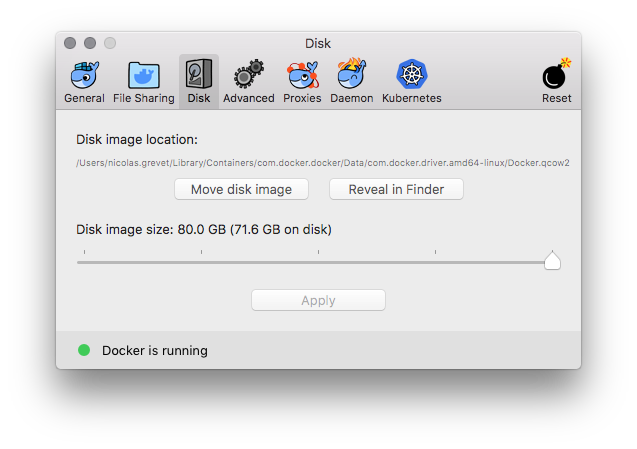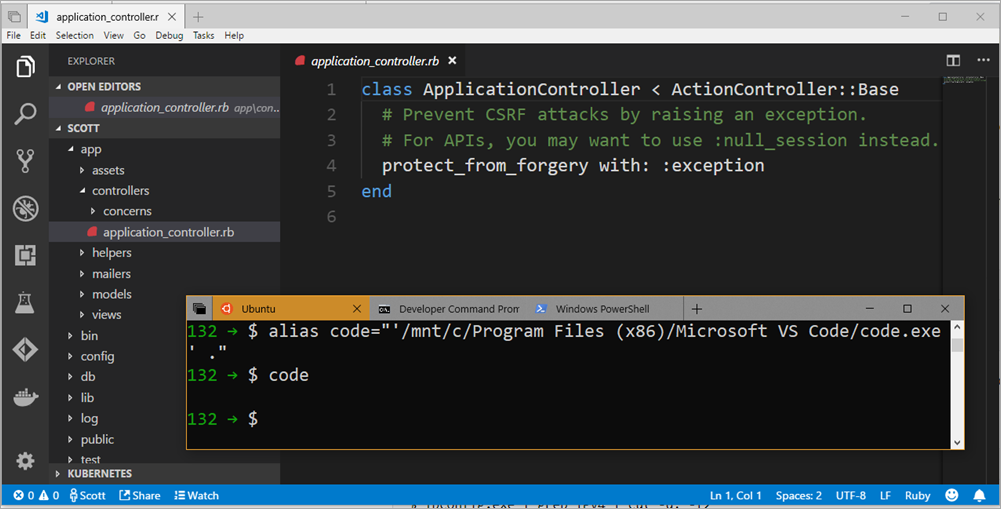Install Man Pages Issue 743 Docker/for-mac Github
- Install Man Pages Issue 743 Docker/for-mac Github Login
- Install Man Pages Issue 743 Docker/for-mac Github Desktop
- Install Man Pages Issue 743 Docker/for-mac Github Tutorial

Running this command to download genomes: fab -f datafabfile.py -H localhost installdatas3 I get the following error: '-Xms500m' is not a valid command. See PicardCommandLine -help for more information. Fatal error: local encountered an error (return code 1) while executing 'picard -Xms500m -Xmx1g CreateSequenceDictionary REFERENCE=/mnt/biodata/genomes/phiX174/phix/seq/phix.fa OUTPUT=/mnt/biodata/genomes/phiX174/phix/seq/phix.dict' Aborting. Context: I'm using Mac OS X. I would eventually be interested in using bcbio+Docker on Mac.
Install Man Pages Issue 743 Docker/for-mac Github Login
Looks like that would be a great platform. For now, I tried a CloudBioLinux install, but I noticed that there's some fragility with regard to python package names. It failed because age-metasv is not a valid python package name in my context. At that point, I scaled my ambitions back and am just installing tools singly using brew.
After I installed a few basic NGS tools, I tried the genome download, and I am now stuck at the above error. Erron; Sorry about the problems and confusion. CloudBioLinux is undergoing a bit of a transition, in part to be more friendly to alternative install environments like OSX. It supports a lot more desktop installs than initially envisioned by the name, so we've tried to migrate to help with that.

Specifically, we're moving all of the tool installs to bioconda: If you install picard (and any other bio tools you might like - there are a lot of recipes ported: ) and re-run things shoudl work cleanly for you. The picard install from bioconda has a bit smarter shell script that handles setting memory, which the homebrew one does not. Hope that helps get things going for you. Thanks so much! I switched over to bioconda to build my environment. Fyi, the genome download still fails. It chugs through a few genomes with no errors but then halts with a 404 error for this: wget -continue -no-check-certificate -O hg38-bwa.tar.xz ' Best, Erron On Fri, Apr 8, 2016 at 10:57 AM, Brad Chapman wrote: Erron; Sorry about the problems and confusion.
CloudBioLinux is undergoing a bit of a transition, in part to be more friendly to alternative install environments like OSX. It supports a lot more desktop installs than initially envisioned by the name, so we've tried to migrate to help with that. Specifically, we're moving all of the tool installs to bioconda: If you install picard (and any other bio tools you might like - there are a lot of recipes ported: ) and re-run things shoudl work cleanly for you. The picard install from bioconda has a bit smarter shell script that handles setting memory, which the homebrew one does not. Hope that helps get things going for you. — You are receiving this because you authored the thread.
Reply to this email directly or view it on GitHub. Erron; Sorry about the install troubles.
I pushed a small change to CloudBioLinux (you can pull to your local version with git pull origin master) that changes the behavior of the installdata target, which is what you want to use: fab -f datafabfile.py -H localhost installdata CloudBioLinux has a few different methods to install data and installdatas3 only tries to download pre-built genome indices on S3. We don't have these for every genome and the installdata retrieves from other public sources.
Install Man Pages Issue 743 Docker/for-mac Github Desktop
Hopefully this works cleanly for you and sorry again about the confusion. We're moving to a more standardized method for this but that's currently in progress.
Hopefully longer term you'll have a cleaner experience with this. Hi Brad, Thanks again. Your directing me to bioconda was critically helpful. There is another downstream error (below). I think it's from the mirbase.yaml recipe. Note zcat on Mac OS X trying to append the '.Z' to an input filename.
Presumably a well-known Mac vs Linux issue, but here's additional info just in case:. And specifically, 'When invoked as zcat, ``.Z' will be appended to all filenames that do not have that suffix.' That mirbase.yaml recipe is trying to do heroic work. It's a lot to attempt in this context. Is the best thing for me to just remove or rename the recipe files that I might not currently need?
Install Man Pages Issue 743 Docker/for-mac Github Tutorial
After I update my Docker version to 0.8.0, I get an error message while entering sudo docker version: Client version: 0.8.0 Go version (client): go1.2 Git commit (client): cc3a8c8 2014/02/19 12:54:16 Can't connect to docker daemon. Is 'docker -d' running on this host? And I've followed the instructions and entered command sudo docker -d, and I got this: /var/lib/docker 2462000b +job initserver /var/lib/docker 2462000b.initserver Creating server open /var/lib/docker/aufs/layers/cf2414da53f9bcfaa48bc3d58360d7f1cfd3784e4fe51fbef95197709dfc285d: no such file or directory/var/lib/docker 2462000b -job initserver = ERR (1) 2014/02/19 12:55:57 initserver: open /var/lib/docker/aufs/layers/cf2414da53f9bcfaa48bc3d58360d7f1cfd3784e4fe51fbef95197709dfc285d: no such file or directory How do I solve the problem? Linux The documentation reveals the following steps:.
Create the docker group. Sudo groupadd docker.
Add the user to the docker group. Sudo usermod -aG docker $(whoami). Log out and log back in to ensure docker runs with correct permissions. Start docker.
Sudo service docker start Mac OS X As says is necessary to add environments variables: docker-machine start # Start virtual machine for docker docker-machine env # It's helps to get environment variables eval '$(docker-machine env default)' # Set environment variables The docker-machine start command outputs the comments to guide the process. Linux To run docker daemon on Linux (from ), run: $ sudo service docker start # Ubuntu/Debian Note: Skip the $ character when copy and pasting. On RedHat/CentOS, run: sudo systemctl start docker. To initialize the 'base' filesystem, run: $ sudo service docker stop $ sudo rm -rf /var/lib/docker $ sudo service docker start or manually like: $ sudo docker -d -storage-opt dm.basesize=20G Install docker-machine on Linux To install machine binaries on Linux:.
locally: install -vm755. After a detailed investigation, this issue seems to happen every time after Mac OS X is rebooted (or the Docker virtual machine is restarted) which prevents the Docker client from connecting to the Docker daemon. The best way to find out why Docker isn't working will be to run the daemon manually. $ sudo service docker stop $ ps aux grep docker # do this until you don't see /usr/bin/docker -d $ /usr/bin/docker -d The Docker daemon logs to STDOUT, so it will start spitting out whatever it's doing. Here was what my problem was: 8bf47e42.initserver Creating pidfile 2015/01/11 15:20:33 pid file found, ensure docker is not running or delete /var/run/docker.pid This was because the instance had been cloned from another virtual machine.
I just had to remove the pidfile, and everything worked afterwards. Of course, instead of blindly assuming this will work, I'd suggest running the daemon manually one more time and reviewing the log output for any other errors before starting the service back up. I have the same error and trying docker-machine regenerate-certs or eval. Did not work for me. This on OS X 10.11.3 (El Capitan) and Docker v1.10.1. I was able to fix it only by deleting and recreating docker-machine again. If running docker-machine ls, it shows you a similar output to the one below; DOCKER Unknown ERRORS Unable to query docker version: Cannot connect to the docker engine endpoint Try removing your Docker machine with; docker-machine rm -f default Where default is your Docker machine name.
Then; docker-machine create -d virtualbox default Creates a new Docker machine. Double check that everything looks normal now (no errors or unknown Docker) with: docker-machine ls Finally don't forget to run '$(docker-machine env default)' before you continue or run the Docker Quickstart Terminal which does it for you.